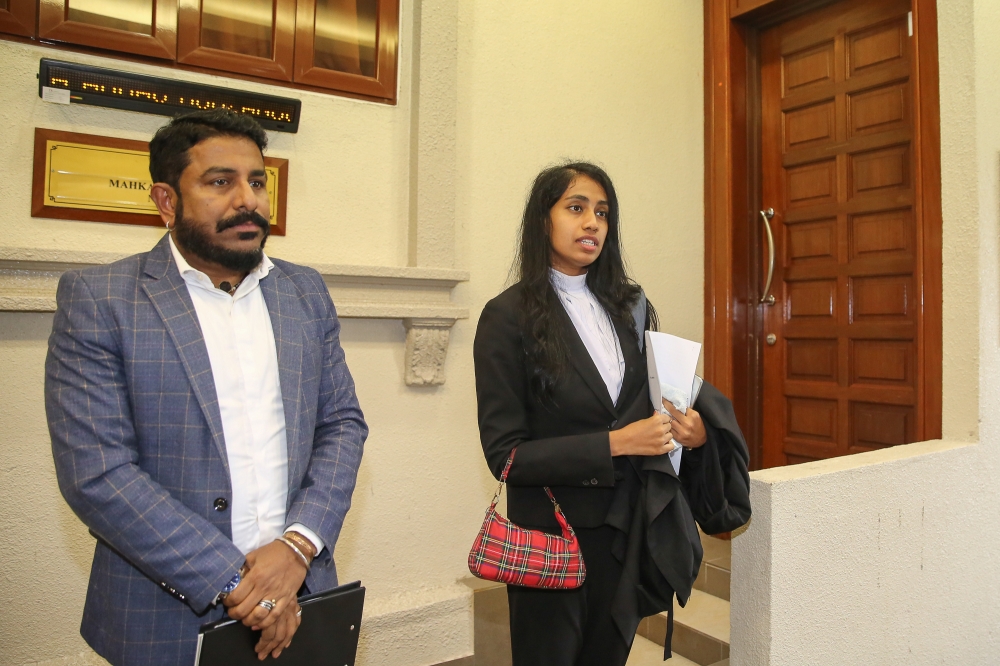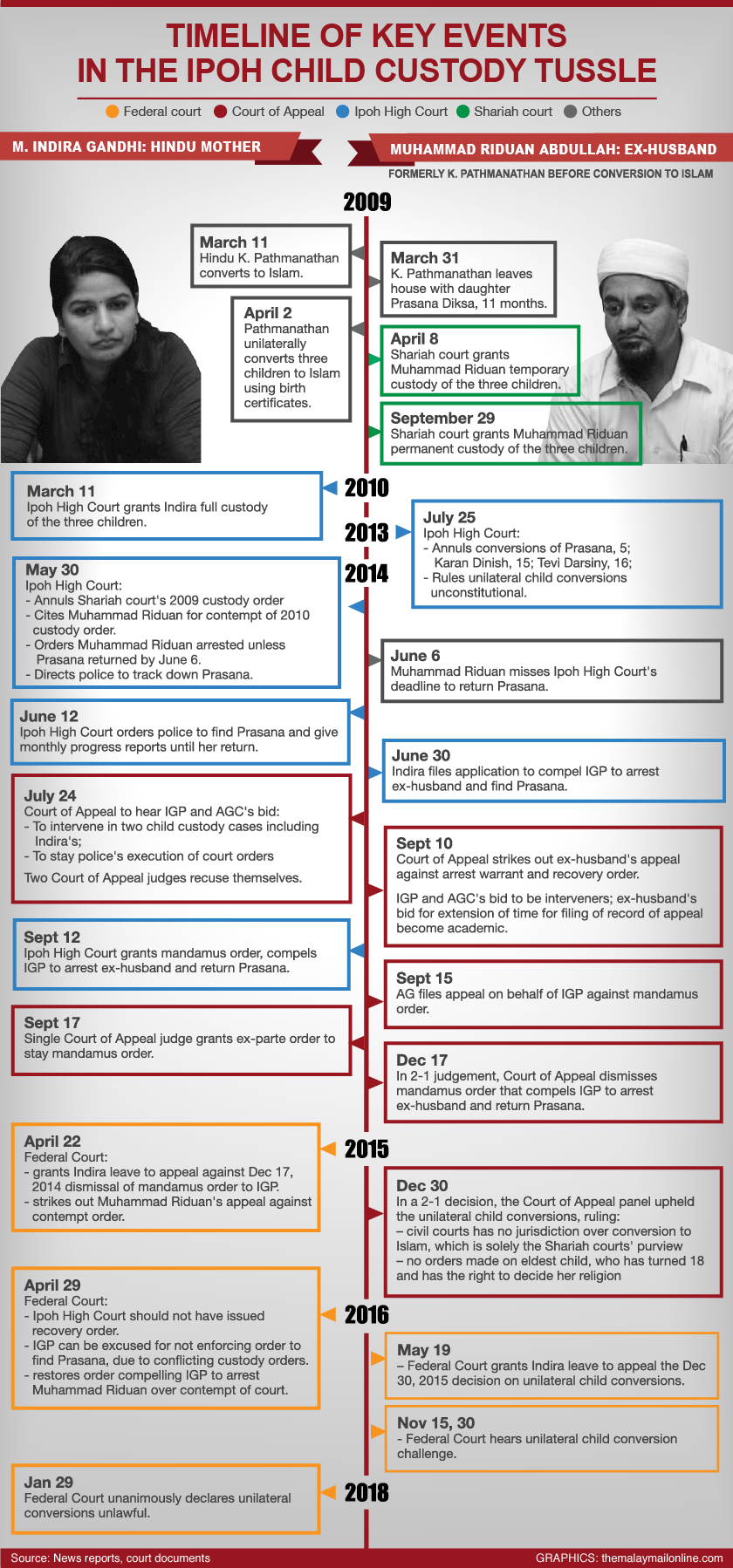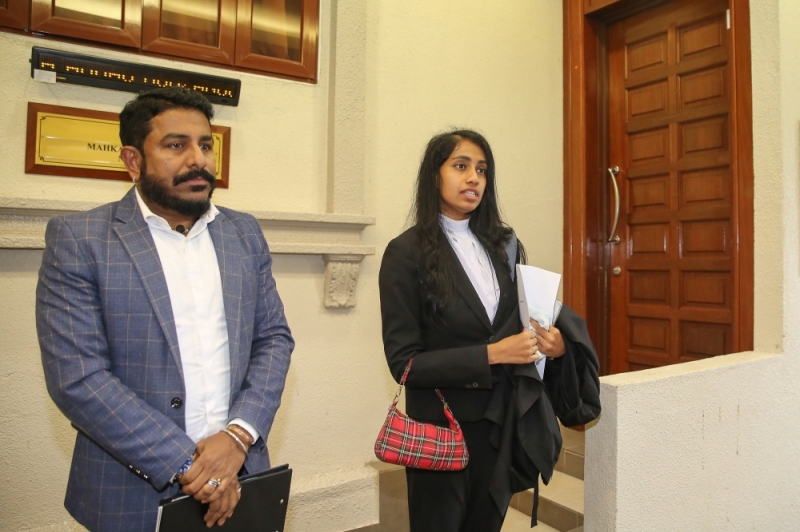- M. Indira Gandhi failed to declare the Inspector-General of Police (IGP) and the government of neglecting a Federal Court order to arrest her ex-husband and return her daughter, Prasana Diksa, abducted 15 years ago.
- The High Court said the IGP's and police's efforts to find Indira's ex-husband showed that they did not neglect their duties or had any ill-intention in this matter.
- The court also said there is evidence that an investigation has been conducted and is still in progress.
- Indira filed the suit in 2020, alleging the IGP had deliberately and negligently disregarded a court order to recover her missing daughter. She was seeking damages for the emotional distress this had caused.
KUALA LUMPUR, June 28 — Hindu mother M. Indira Gandhi today failed at the High Court in her lawsuit to have the Inspector-General of Police (IGP) declared as having failed in his duties in public office, with the court also finding that both the national police chief and the police had not neglected their duties to track down her former husband.
Indira has been separated from her daughter Prasana Diksa for more than 15 years now, after her former husband abducted the child when she was just 11 months old. Prasana Diksa is now aged 16.

This afternoon at the High Court here, Judicial Commissioner Datuk Raja Ahmad Mohzanuddin Shah Raja Mohzan dismissed Indira's lawsuit after considering the Federal Court's 2016 decision related to this case. The judge gave no order for costs.
In delivering the broad grounds of his decision, the judge began by saying that "it is impossible to imagine the agony" that Indira had experienced, with her barely year-old youngest daughter Prasana Diksa taken away from her in 2009.
Noting that Indira's "anguish and pain as a mother has persisted to the present time", the judge also said: "Sadly, the plaintiff has never met her youngest daughter again. it is unknown where the beautiful daughter of hers is located."
Indira and her Muslim convert ex-husband Muhammad Riduan Abdullah had married as non-Muslims, but the latter took the youngest child away before converting himself and the couple's three children without Indira's knowledge.
Riduan had obtained custody in the Shariah court over the three children, while the civil court granted custody of all children to Indira.
In May 2014, the civil High Court in Ipoh also issued a committal order for Riduan to be arrested for contempt of court over his failure to return Prasana Diksa to Indira, and also issued a recovery order by directing the police to find the youngest child.
Indira subsequently obtained in the High Court in September 2014 a mandamus order which compelled the IGP to enforce the two court orders, with the Court of Appeal later dismissing the mandamus order and the Federal Court in April 2016 restoring the mandamus order for the arrest of Riduan.
In this lawsuit, Indira's claim was that the IGP had failed to perform a legal duty to enforce the mandamus order by failing to enforce the High Court in Ipoh's two court orders: to arrest her Muslim convert ex-husband Muhammad Riduan Abdullah for contempt of court and to retrieve Prasana Diksa.
Indira claimed that the IGP's conduct had caused her extended separation from Prasana Diksa and enabled her ex-husband to evade capture.
In other words, Indira was claiming that the IGP had committed a tort of misfeasance in public office or failed to perform his legal duties in relation to three court orders (the mandamus order, committal order and recovery order.)
But the High Court in Kuala Lumpur today noted the Federal Court had in its April 29, 2016 decision said the civil High Court could not issue a recovery order for Prasana Diksa. The judge today also said the Federal Court had said the civil High Court in Ipoh could not compel the IGP to execute the recovery order due to the existence of the two conflicting custody orders by the Shariah and civil High Court.
The judge today concluded that the Federal Court's decision had the effect of upholding the Court of Appeal's dismissal of the mandamus order or order to compel the IGP to recover Prasana Diksa: "Thus I find there was no mandamus order issued to the IGP to enforce or execute the recovery order."
The judge today also said the Federal Court's decision had the effect of setting aside the civil High Court's order to recover Prasana Diksa, saying: "This conclusion is based on the fact that the Federal Court found that the civil High Court could not direct the IGP to execute the recovery order."
The judge then agreed with the Attorney-General's Chambers' view that Indira's claim against the IGP for failure to perform his duties by failing to execute the recovery order to find her daughter is "clearly a non-starter and misconceived."
As for Indira's claim that the IGP failed to enforce the committal order to arrest her former husband, the High Court today said the Federal Court in the same April 2016 decision had observed that case was no longer just about the couple's private rights on child custody but has become a matter of challenge to the administration of justice since it involved the ex-husband's wilful disobedience of a court order.
After looking at the Federal Court's decision, the High Court said the issue of the police's enforcement of the order to arrest Riduan does not affect Indira's personal rights as it has become a public law matter involving the administration of justice.
The judge concluded that Indira cannot proceed with her lawsuit against the IGP in relation to the order to arrest Riduan: "As a result of making such findings, I find that the plaintiff is no longer entitled to pursue her claim based on her private rights as a result of the IGP's alleged failure to execute the warrant of committal."
After dismissing Indira's claims against the IGP based on the alleged failure to enforce the orders to arrest Riduan and to recover her child, the High Court today went on to dismiss Indira's claim against the IGP over the alleged failure to enforce the mandamus order.
Noting that Indira had claimed that the police had conducted a fake investigation and that the police had not given evidence of their investigations outside Malaysia in relation to this case, the judge then went on to examine the testimony given by then IGP Tan Sri Abdul Hamid Bador in February 2024 in this lawsuit.
The judge cited various testimony by Abdul Hamid including that the police had tried to locate Riduan since the High Court in Ipoh's September 2014 mandamus order and had searched for him in parts of Perak and Kelantan.
The judge also noted that Assistant Superintendent Yap Siew Cheng as the senior investigating officer had tried to find Riduan's updated address by asking for information from the Employees Provident Fund (EPF), the Inland Revenue Board (LHDN), the Election Commission, the Perak Education Department and the National Registration Department's Perak branch.
As for Indira's claim that the IGP was aware of Riduan's whereabouts when the police chief in January 2020 said he was looking for a "happy ending" with an amicable settling of the matter for all parties involved, the judge today concluded that the "IGP had the general perception" that the ex-husband "was in southern Thailand based on intelligence reports and that he felt obliged to provide this information to the media" and noted the IGP had clarified that all processes have to be handled through the court system.
The judge said the IGP's testimony showed he was committed to solving the case and felt sympathy to Indira to the point of sending his officers to convince her to meet him, and said he had no doubt in accepting the IGP's testimony that the police had asked for the International Criminal Police Organization's (Interpol) help to find Riduan.
Noting that Indira still has to show malice or bad faith by the police in order to succeed in her claim of the IGP's tort of misfeasance or failure to perform legal duties, the High Court today concluded that "neither the IGP nor the PDRM have any ill-intentions in this matter". This was based on the High Court's acceptance of the testimony by Abdul Hamid and Yap in this lawsuit regarding the entire investigation process.
Among other things, the High Court said it was impossible to conclude that the IGP and the police did not attempt to locate the ex-husband.
The High Court also said this case was not a scenario where the ex-husband was "roaming around Kuala Lumpur or any other area in the presence of the police, without the police taking any action despite noticing his appearance", and that he would have viewed that factor in Indira's favour if that was the case.
Instead, the High Court said the facts indicated that the ex-husband's location was unknown and that there was evidence to suggest he was in Thailand at some point in time.
The High Court then concluded that the evidence suggests all the efforts made by the IGP and the police did not indicate "any neglect of their duties".
"Furthermore, based on the evidence available to me, I conclude that the IGP and PDRM exercised their duties in the manner they considered to be most appropriate. The manner in which they conducted their investigation is within their wide discretion, and I am in no position to second-guess them.
"Essentially, what matters to me is that there is evidence that an investigation has been conducted and is still in progress," the judge said, before concluding that Indira's lawsuit is dismissed.
On October 28, 2020, Indira filed the civil lawsuit against the Inspector-General of Police, the Royal Malaysia Police, the Home Ministry and the Malaysian government.
In this lawsuit, Indira had sought for a declaration that the IGP has committed the tort of nonfeasance in public office, and a declaration that the other three respondents are vicariously liable for the tort of nonfeasance committed by the IGP, and for compensation in the form of general damages, aggravated damages and exemplary damages.
Indira was claiming for general damages for the pain and anxiety she suffered due to constant worry over Prasana’s safety and wellbeing, and exemplary damages against all four respondents for failing to enforce the court orders.

Recommended reading:
- Simplified: The Federal Court’s groundbreaking Indira Gandhi judgment
- Lawyers explain: When Federal Court says unilateral conversion unconstitutional, but state laws say OK
- Conversion to Islam without both parents’ consent: Indira Gandhi, two ‘victims’ file court challenge against such laws
- Unilateral conversion is a violation of human rights — Sisters in Islam




















